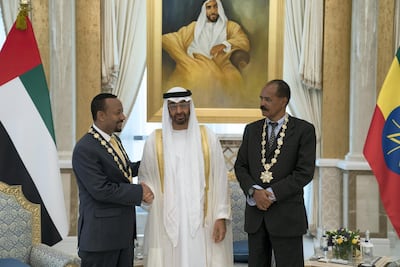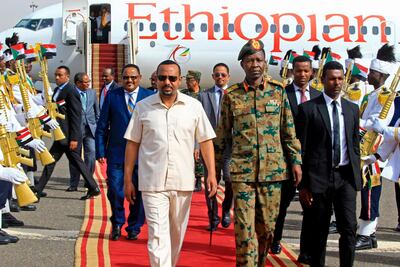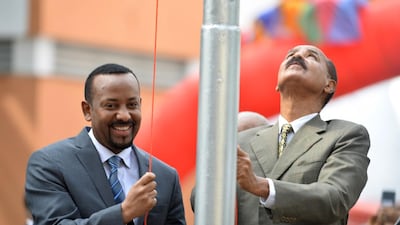Ethiopia's prime minister Abiy Ahmed was awarded the 100th Nobel Peace Prize in Oslo on Friday for his work in establishing peace with neighbouring Eritrea.
The Norwegian Nobel Committee said Mr Abiy won "for his efforts to achieve peace and international co-operation, and in particular for his decisive initaitve to resolve the border conflict with neighbouring Eritrea".
He will receive the award, which is worth nine million Swedish crowns (Dh3.36 million), in December.
301 candidates were nominated for the esteemed prize, including 223 individuals and 78 organisations.
Most nominees have not been disclosed, but some of the known ones included 16-year-old climate activist Greta Thunberg, German Chancellor Angela Merkel, New Zealand's Prime Minister Jacinda Ardern and activists in Hong Kong.
Although seen as outsiders, US President Donald Trump and Indian leader Narendra Modi were also said to be nominated for the award.
In line with the principles of the award, the full list of nominees and their nominators will not be revealed to the public for another 50 years.
Sheikh Mohamed bin Zayed, Crown Prince of Abu Dhabi and Deputy Supreme Commander of the Armed Forces, congratulated Mr Abiy on winning the award on Friday.
In a tweet, he said: "My sincere congratulations to my dear friend Dr Abiy Ahmed on winning the #NobelPeacePrize. He is a wise man who has brought peace and hope to his country and region. The prize is a well-deserved honour for an extraordinary leader."
Sheikh Mohamed met the Ethiopian leader when he visited Abu Dhabi in July 2018.
On that visit, Mr Abiy met former rival Eritrean President Isaias Afwerki were honoured with the UAE’s highest civil honour for their reconciliation efforts.
Sheikh Mohamed conferred the Order of Zayed on both leaders at the Presidential Palace in the capital.
It followed a remarkable detente between the two African nations after years of conflict and underlined the UAE's role in bringing both sides together.
At the time, Sheikh Mohamed said the agreement would lead to a brighter future for both countries.
"We have an utmost trust that this move will enhance the bilateral cooperation and coordination between the two neighbouring countries. And will fulfil their citizens' aspirations to achieve peace, development and prosperity,” he wrote on Twitter.
“It will [also] ensure stability and security in the Horn of Africa and the region in general."
Jens Stoltenberg, Nato Secretary General, also congratulated Mr Abiy on the award.
In a tweet, he said: "Congratulations to Prime Minister @AbiyAhmedAli of Ethiopia on the #NobelPeacePrize. You have demonstrated that with patience, courage and conviction, peace is possible. #NobelPrize."
António Guterres, Secretary-General of the UN, issued a statement congratulating Mr Abiy for his win.
“I have said often that winds of hope are blowing ever stronger across Africa. Prime Minister Abiy Ahmed is one of the main reasons why.
"His vision helped Ethiopia and Eritrea achieve a historic rapprochement, and I was honoured to witness the signing of the peace agreement last year," he added.
"This milestone has opened up new opportunities for the region to enjoy security and stability, and Prime Minister Ahmed’s leadership has set a wonderful example for others in and beyond Africa looking to overcome resistance from the past and put people first.”
Under Mr Abiy's leadership, Ethiopia has been in transformation from an authoritarian state to a fully-functioning democracy. He released journalists and political prisoners, whose voices had previously been silenced.
Before Mr Abiy took over, the country had been hampered by anti-government protests, with demonstrators demanding an end to human rights abuses, as well as social reforms.
The government responded with violent crackdown on the protesters and restricting the internet. Human Rights Watch said at least 500 people were estimated to have been killed in the riots in October.
But when Mr Abiy took the healm in April that year, he made moves immediately to quell the unrest and reform the economy, which had typically been orientated toward the state.
As part of the ruling coalition, in June 2018, he decided to pursue large scale privatisation of state-owned enterprises and the liberalisation of several key economic sectors long considered off-limits. It was seen as a landmark shift in policy.
The Ethiopian People’s Revolutionary Democratic Front (EPRDF) had a history of being one of the continent’s most autocratic ruling parties, but Mr Abiy began reforming it to promote freedom of expression and democracy.
But that did not come without challenges. Mr Abiy survived an assassination attempt amid riots in June 2016 and faced down a mutiny from his own military by challenging them to a push-ups competition – which he won.
The country's leader has shown to be a champion of gender equality, appointing a female president of Ethiopia and ensuring that half of his cabinet ministers were women.
He also introduced a national “green legacy” initiative in July to grow 4 billion trees in Ethiopia to tackle the effects of deforestation and climate change in the country, where droughts are common.
Ethiopia is Africa’s second most populous country and east Africa’s largest economy and many other its neighbours now see it as a political and economic model to follow.
But challenges remain ahead and Mr Abiy still has a lot of work to do. He looks to carry out democratic elections in 2020 but still faces old problems, including long-standing communal and ethnic tensions within his own country. And despite some of the slums being cleared out of the country's urban areas, poverty in Ethiopia is still rife.
Full statement from Norwegian Nobel Committee:
The Norwegian Nobel Committee has decided to award the Nobel Peace Prize for 2019 to Ethiopian Prime Minister Abiy Ahmed Ali for his efforts to achieve peace and international cooperation, and in particular for his decisive initiative to resolve the border conflict with neighbouring Eritrea.
The prize is also meant to recognise all the stakeholders working for peace and reconciliation in Ethiopia and in the East and Northeast African regions.
When Abiy Ahmed became Prime Minister in April 2018, he made it clear that he wished to resume peace talks with Eritrea. In close cooperation with Isaias Afwerki, the President of Eritrea, Abiy Ahmed quickly worked out the principles of a peace agreement to end the long “no peace, no war” stalemate between the two countries.

These principles are set out in the declarations that Prime Minister Abiy and President Afwerki signed in Asmara and Jeddah last July and September. An important premise for the breakthrough was Abiy Ahmed’s unconditional willingness to accept the arbitration ruling of an international boundary commission in 2002.
Peace does not arise from the actions of one party alone. When Prime Minister Abiy reached out his hand, President Afwerki grasped it, and helped to formalise the peace process between the two countries. The Norwegian Nobel Committee hopes the peace agreement will help to bring about positive change for the entire populations of Ethiopia and Eritrea.
In Ethiopia, even if much work remains, Abiy Ahmed has initiated important reforms that give many citizens hope for a better life and a brighter future. He spent his first 100 days as Prime Minister lifting the country’s state of emergency, granting amnesty to thousands of political prisoners, discontinuing media censorship, legalising outlawed opposition groups, dismissing military and civilian leaders who were suspected of corruption, and significantly increasing the influence of women in Ethiopian political and community life. He has also pledged to strengthen democracy by holding free and fair elections.
In the wake of the peace process with Eritrea, Prime Minister Abiy has engaged in other peace and reconciliation processes in East and Northeast Africa.

In September 2018 he and his government contributed actively to the normalisation of diplomatic relations between Eritrea and Djibouti after many years of political hostility. Additionally, Abiy Ahmed has sought to mediate between Kenya and Somalia in their protracted conflict over rights to a disputed marine area. There is now hope for a resolution to this conflict. In Sudan, the military regime and the opposition have returned to the negotiating table. On the 17th of August, they released a joint draft of a new constitution intended to secure a peaceful transition to civil rule in the country. Prime Minister Abiy played a key role in the process that led to the agreement.
Ethiopia is a country of many different languages and peoples. Lately, old ethnic rivalries have flared up. According to international observers, up to three million Ethiopians may be internally displaced. That is in addition to the million or so refugees and asylum seekers from neighbouring countries. As Prime Minister, Abiy Ahmed has sought to promote reconciliation, solidarity and social justice. However, many challenges remain unresolved. Ethnic strife continues to escalate, and we have seen troubling examples of this in recent weeks and months. No doubt some people will think this year’s prize is being awarded too early. The Norwegian Nobel Committee believes it is now that Abiy Ahmed’s efforts deserve recognition and need encouragement.
The Norwegian Nobel Committee hopes that the Nobel Peace Prize will strengthen Prime Minister Abiy in his important work for peace and reconciliation. Ethiopia is Africa’s second most populous country and has East Africa’s largest economy. A peaceful, stable and successful Ethiopia will have many positive side-effects, and will help to strengthen fraternity among nations and peoples in the region. With the provisions of Alfred Nobel’s will firmly in mind, the Norwegian Nobel Committee sees Abiy Ahmed as the person who in the preceding year has done the most to deserve the Nobel Peace Prize for 2019.
Nobel Week
The prestigious peace prize caps off a week of Nobel awards handed out in Stockholm in science fields and literature. Ten of the 11 awards were given to men.
Three scientists won the Nobel Medicine Prize for discoveries on how cells sense and adapt to oxygen availability. The Nobel jury said US researchers William Kaelin and Gregg Semenza and Britain's Peter Ratcliffe have "paved the way for promising new strategies to fight anemia, cancer and many other diseases."
On Tuesday, the Nobel Prize for Physics was jointly-won by Canadian-American James Peebles and Swiss nationals Michel Mayor and Didier Queloz for their contributions to understanding of the evolution of the Universe.
The 2019 Nobel Prize in Chemistry was awarded on Wednesday to John B Goodenough, M Stanley Whittingham and Akira Yoshino for the development of lithium-ion batteries.
The two literature prizes were awarded on Thursday; one for the postponed 2018 award that went to Polish novelist Olga Tokarczuk. Austrian author Peter Handke won this year's award.
With each prize comes a nine million kronor ($918,000) cash award, a gold medal and a diploma. Even though the peace prize is awarded in Norway, the amount is denominated in Swedish kronor.
Previous Nobel Peace Prize winners
Since 1901, 99 Nobel Peace Prizes have been handed out, to individuals and 24 organisations:
























